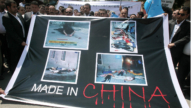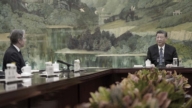【新唐人2013年08月24日讯】英国《路透社》最近报导披露,一名中共发改委官员,在一次闭门会议上,向大约30家左右的外企施压,要求他们“坦白”所谓的垄断行为,并且威胁:不得聘请外部律师来对抗指控,否则,会将罚金翻高一倍或两倍。那么,外界是怎么看待这起事件的呢?我们一起来了解。
据《路透社》8月21号发自北京的报导,一名消息人士指称,中共发改委官员徐新宇在7月24至25号的闭门会议上,向通用电气和西门子等大约30家外企施压,要求他们“坦白”垄断行为,并且警告这些外企,不得聘请外部律师来对抗监管机构的指控。
据报导,这次会议是以对跨国企业的培训为名义举行的。当时也有中共商务部和国家工商总局的官员在场。
美国纽约城市大学政治学教授夏明观察认为,中共发改委官员要求外企不得聘请外部律师,是因为中国的法律可能会和国际上发生矛盾和冲突。
夏明:“中国(共)政府显然不愿意看到在国际司法平台上,中国(共)要去对抗西方的法律体系和法律规范。所以从某种程度上,它也是威胁在中国有投资的企业:就是不要把事情搞大,也不要让中国政府(共)有太多的难堪。”
两名参加这次会议的消息人士声称,徐新宇还向内部律师演示了如何撰写所谓的“自我批评”,并且展示了过去反垄断案中一些企业承认垄断行为的信件副本。
一名与会的消息人士表示,徐新宇提到在场的企业中,有一半正接受或已经接受过发改委的调查。另一名消息人士则认为,徐新宇的话太过分。如果这些外企想对抗,徐新宇可以将罚金翻一倍或两倍。
这则消息在网路上也引起围观。有网友认为发改委真是无法无天。一名青岛网友海泰祥,则质疑:你发改委不也是个垄断机构吗?
夏明分析,目前中国的经营环境处于垄断状态。中共为了保护国营企业,想用“反垄断”这个武器,来阻止西方国家的跨国企业。
夏明:“在最近几年国营企业、尤其大中型国营企业出现国进民退了,显然它给私营企业和三资企业带来了很多压力,使它们的经营环境更加恶化。在这种情况下,西方国家,尤其在大的产业上,在全球有一定的技术优势,在中国经营,很容易摧毁中国没太有效率又没有技术含量的产业。”
另一方面,夏明指出,西方国家对中共在海外的恶性投资或并购,已经有所警惕,并且采取了各种反垄断和反倾销的措施。所以某种程度上,中共也是在报复西方国家,并且谋求讨价还价。
台湾国立政治大学国际关系研究中心、美国与欧洲研究所所长汤绍成:“当然他们还是觉得有些外企可以给它带来很大的利益。可是有一批(外企)踩到了国企的红线或痛脚,这样他们可能会有些‘翻脸不认人’的情况。”
汤绍成表示,目前在中国做生意,纯粹讲法律的话,很多事情做不了。所以外企到了大陆后,它们也会有一些不合法的行为,这些把柄就给了当局一个很好的借口来整顿。
《路透社》认为,这个消息凸显了外企和中共监管机构的关系趋于紧张。近期反垄断界关于这次会议的消息传得沸沸扬扬。
夏明:“跨国公司逐渐形成一个共识,认为在中国做生意会越来越困难,甚至对他们的员工、他们自己的生命都造成一些安全(问题)。 西方国家跨国公司现在对中国的投资环境进行评估,基本采取一种收缩的战略。”
据报导,对于这次会议,西门子声称不知道、通用电气则不愿置评。
采访/易如 编辑/王子琦 后制/李勇
Chinese Regime Retaliates Against Foreign Companies in China
British Reuters recently reported that a Chinese official
from the Communist Reform Commission put pressure on foreign companies,
asking them to confess alleged monopolistic behavior, and
requiring them not to hire outside lawyers to fight allegations.
Otherwise, their fines would double or triple.
So, how do you view this incident?
On August 21, Reuters reported from Beijing that
a source alleged that
official Xu Xinyu spoke during a closed-door meeting, asking
30 foreign companies to confess monopolistic behavior
and not to hire outside lawyers to fight allegations
of regulatory agencies.
According to reports, this meeting was held for
multinational enterprise training.
Many officials from the Ministry of Commerce
and State Administration for Industry were also present.
Professor Xia Ming, political science,
City University of New York, thinks that
a Chinese official asked companies not to hire outside
lawyers because there might be conflicts between the Chinese and international laws.
Xia Ming: “The Chinese Communist Party (CCP) is reluctant
to show China’s intention to fight against the Western legal
system on the international judicial platform.
To some extent, it also threatens foreign investments in China.
In other words, keep things simple and don’t embarrass
the CCP.”
Two People who attended the meeting claimed that
Xu Xinyu showed a copy of self-criticism and
some copies of other enterprises’ confessions in the past.
Half of the companies attending the meeting had
received the survey or in the process of getting one.
Others said Xu’s remarks were too severe.
If these foreign companies want to fight,
Xu Xinyu may increase their fines.
This news also attracted negative responses from netizens.
A Qingdao netizen said, “Isn’t the National Development
and Reform Commission (NDRC) also a monopolistic organization?"
Xia Ming believes that current businesses are
in a monopoly status in China.
The CCP wants to protect state-owned enterprises, so it uses
anti-monopoly to stop multinational corporations from the West.
Xia Ming: “In recent years, many large state-owned
enterprises advanced and put much pressure
on private sector and foreign enterprises,
worsening their operating environment.
Under this circumstance, many large Western industries
possess certain technical advantages,
when operating in China, can easily destroy China’s
inefficient and non-tech industries."
Xia also pointed out that Western countries have adopted
various anti-monopoly and anti-dumping measures
because they are aware of CCP’s vicious investments,
mergers and acquisitions overseas.
So, to some extent, this is retaliation against
Western countries and leverage in bargaining.
Tang Shao-Cheng, director of International Relations Research
Center, Taiwan’s National Chengchi University: “Of course,
the CCP realizes foreign investments in China
are a good thing,
but these foreign enterprises stepped on the toes of
state-owned enterprises, so it reacts and shows its anger."
Tang Shao-Cheng: “If foreign companies strictly follow
Chinese law, they cannot do much business in China.
So, they did something illegal, which gives the CCP
an excuse to rectify the situation."
Reuters believes that the news highlights the strained
relationship between foreign companies and the CCP’s regulatory agencies.
Recent news of anti-monopoly has caused uproar.
Xia Ming: “Foreign companies have formed a consensus,
namely, doing business in China is difficult
and their employees’ lives may be endangered.
Therefore, the Western countries are basically re-evaluating
their investment environment and taking a contraction strategy."
According to reports, Siemens, as its reaction, claimed
to not know about this meeting and General Electric was unwilling to comment.




























